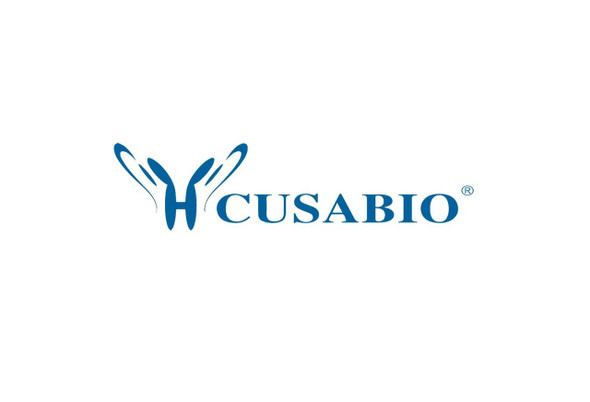Cusabio Human Recombinants
Recombinant Human Cysteine and glycine-rich protein 3 (CSRP3) | CSB-EP006087HU
- SKU:
- CSB-EP006087HU
- Availability:
- 3 - 7 Working Days
Description
Recombinant Human Cysteine and glycine-rich protein 3 (CSRP3) | CSB-EP006087HU | Cusabio
Alternative Name(s): Cardiac LIM protein;Cysteine-rich protein 3 ;CRP3LIM domain protein, cardiacMuscle LIM protein
Gene Names: CSRP3
Research Areas: Developmental Biology
Organism: Homo sapiens (Human)
AA Sequence: MPNWGGGAKCGACEKTVYHAEEIQCNGRSFHKTCFHCMACRKALDSTTVAAHESEIYCKVCYGRRYGPKGIGYGQGAGCLSTDTGEHLGLQFQQSPKPARSVTTSNPSKFTAKFGESEKCPRCGKSVYAAEKVMGGGKPWHKTCFRCAICGKSLESTNVTDKDGELYCKVCYAKNFGPTGIGFGGLTQQVEKKE
Source: E.coli
Tag Info: N-terminal 6xHis-SUMO-tagged
Expression Region: 1-194aa
Sequence Info: Full Length
MW: 37 kDa
Purity: Greater than 90% as determined by SDS-PAGE.
Relevance: Positive regulator of myogenesis. Plays a crucial and specific role in the organization of cytosolic structures in cardiomyocytes. Could play a role in mechanical stretch sensing. May be a scaffold protein that promotes the assbly of interacting proteins at Z-line structures. It is essential for calcineurin anchorage to the Z line. Required for stress-induced calcineurin-NFAT activation .
Reference: Beyond the sarcomere CSRP3 mutations cause hypertrophic cardiomyopathy.Geier C., Gehmlich K., Ehler E., Hassfeld S., Perrot A., Hayess K., Cardim N., Wenzel K., Erdmann B., Krackhardt F., Posch M.G., Osterziel K.J., Bublak A., Nagele H., Scheffold T., Dietz R., Chien K.R., Spuler S. , Furst D.O., Nurnberg P., Ozcelik C.Hum. Mol. Genet. 17:2753-2765(2008)
Storage: The shelf life is related to many factors, storage state, buffer ingredients, storage temperature and the stability of the protein itself. Generally, the shelf life of liquid form is 6 months at -20?/-80?. The shelf life of lyophilized form is 12 months at -20?/-80?.
Notes: Repeated freezing and thawing is not recommended. Store working aliquots at 4? for up to one week.
Function: Positive regulator of myogenesis. Acts as cofactor for myogenic bHLH transcription factors such as MYOD1, and probably MYOG and MYF6. Enhances the DNA-binding activity of the MYOD1
Involvement in disease: Cardiomyopathy, dilated 1M (CMD1M); Cardiomyopathy, familial hypertrophic 12 (CMH12)
Subcellular Location: Nucleus, Cytoplasm, Cytoplasm, cytoskeleton, Cytoplasm, myofibril, sarcomere, Z line, Cytoplasm, myofibril, sarcomere
Protein Families:
Tissue Specificity: Cardiac and slow-twitch skeletal muscles. Isoform 2 is expressed in striated muscle. Isoform 2 is specifically expressed at higher levels in patients with neuromuscular diseases, such as limb-girdle muscular dystrophy 2A (LGMD2A), Duchenne muscular dystrophy (DMD) and dermatomyositis (PubMed:24860983).
Paythway:
Form: Liquid or Lyophilized powder
Buffer: If the delivery form is liquid, the default storage buffer is Tris/PBS-based buffer, 5%-50% glycerol. If the delivery form is lyophilized powder, the buffer before lyophilization is Tris/PBS-based buffer, 6% Trehalose, pH 8.0.
Reconstitution: We recommend that this vial be briefly centrifuged prior to opening to bring the contents to the bottom. Please reconstitute protein in deionized sterile water to a concentration of 0.1-1.0 mg/mL.We recommend to add 5-50% of glycerol (final concentration) and aliquot for long-term storage at -20?/-80?. Our default final concentration of glycerol is 50%. Customers could use it as reference.
Uniprot ID: P50461
HGNC Database Link: HGNC
UniGene Database Link: UniGene
KEGG Database Link: KEGG
STRING Database Link: STRING
OMIM Database Link: OMIM









